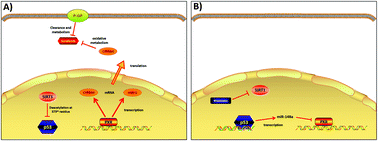Rhamnetin decelerates the elimination and enhances the antitumor effect of the molecular-targeting agent sorafenib in hepatocellular carcinoma cells via the miR-148a/PXR axis†
Abstract
The pregnane X receptor (PXR) mediates the resistance of sorafenib in hepatocellular carcinoma (HCC) by promoting the clearance or elimination of sorafenib via the drug resistance-related downstream genes of the PXR. Previously, we revealed that rhamnetin (a flavonoid functioning as an inhibitor of sirtuin (Sirt)1) could inhibit expression of the downstream gene of the PXR: multidrug resistance 1 (mdr-1). However, how rhamnetin regulates the PXR pathway in HCC cells is not known. Here, we demonstrated that rhamnetin decelerated elimination of the molecular-targeting agent sorafenib in HCC cells via the microRNA (miR)-148a/PXR axis. Rhamnetin treatment decreased expression of the drug resistance-related downstream genes of PXR (cyp3a4 [cytochrome P-450] or mdr-1 [multi-drug resistance 1]), which mediate the metabolism or elimination of sorafenib in HCC cells. Mechanistically, rhamnetin increased expression of miR-148a (which is tumor-suppressive) in a P53-dependent manner, leading to inhibition of PXR expression and decrease in expression of its downstream genes. Rhamnetin enhanced miRNA-148a transcription by repressing Sirt1 activation to enhance acetylation at residue-373 of P53. Rhamnetin treatment decelerated the metabolic clearance of sorafenib in HCC cells and enhanced the sensitivity of HCC cells to sorafenib. Our results suggest that rhamnetin could be a potential agent for overcoming sorafenib resistance in HCC treatment.

- This article is part of the themed collection: Food & Function Recent HOT articles


 Please wait while we load your content...
Please wait while we load your content...